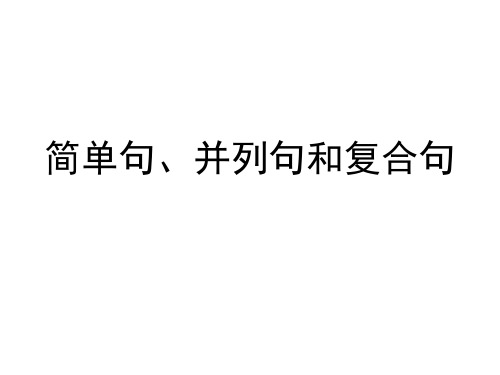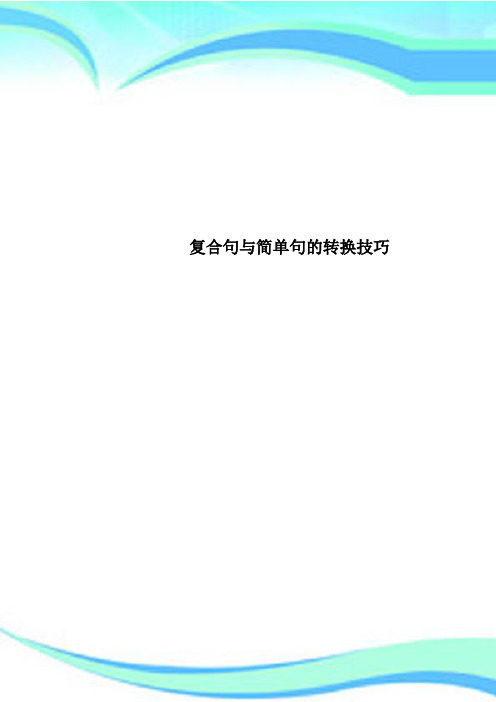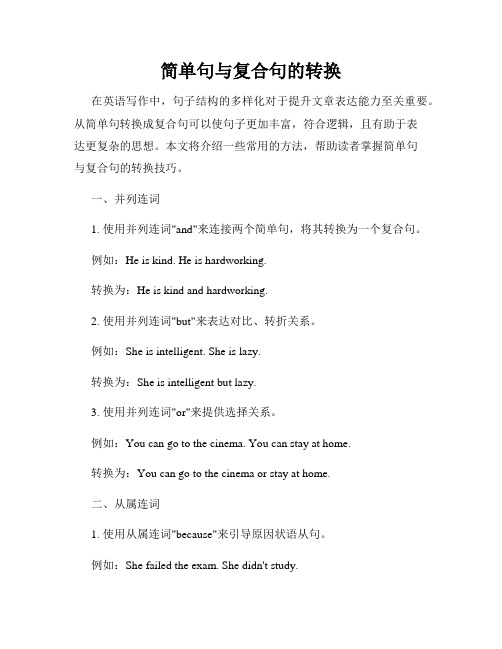英语中复合句与简单句的转换举例
简单句并列句复合句

能连接并列复合句的副词
• besides 而且,还有 • hence 由此,因此 • nevertherless然而 • moreoever加之,因此 • otherwise 否则,要不然 • then 然后,于是 • therefore 因此,要不然 • then 然后,于是 • therefore因此,所以 • thus 因而,从而 • i am not feeling very well today, otherwise i would do
• 第四种句型: • 主语+动词+间接宾语+直接宾语 • 如:He brings me cookies every day. • They gave him a watch.
• 第五种句型: • 主语+动词+宾语+宾语补足语 • 如:He asked me to answer this question. • We often see him play basketball alone.
• 如:The old woman lives alone, but she never feels lonely.
• we love peace but we are not afraid of war.
第三种:表示选择关系
• 此类并列连词有or, otherwise, either…or…等。
• 第二种句型: • 主语+动词+宾语 • 如:He loves his wife.
• We will always remember the junior high school life.
• 第三种句型: • 主语+连系动词+表语 • 如:I am a winner. • The music sounds nice. • We are in the classmate.
复合句与简单句的转换技巧

复合句与简单句的转换技巧Revised as of 23 November 2020复合句与简单句的转换技巧?一、含宾语的复合句转换为简单句即将宾语转换成相应的短语。
如:We expected that you would come. 我们希望你来。
→We expected you to come. 我们希望你来。
Now tell me what I should do. 现在告诉我该怎么办。
→Now tell me what to do. 现在告诉我该怎么办。
I remember I once met her at a party. 我记得在一次晚会上见过他。
→I remember once meeting her at a party. 我记得在一次晚会上见过他。
I ask him what I shall do. 我问他该怎么办。
→I ask him what to do. 我问他该怎么办。
I can’t decide whom I should invit e. 我不能决定该邀请谁。
→I can’t decide whom to invite. 我不能决定该邀请谁。
二、含状语的复合句转换成简单句即将状语转换成状语短语。
如:He can’t come because he is ill. 他因病不能来。
→He can’t come because of his illness. 他因病不能来。
Turn off the light before you leave. 离开前请关灯。
→Turn off the light before leaving. 离开前请关灯。
He went home after he finished his work. 他做完工作后就回家了。
→He went home after finishing his work. 他做完工作后就回家了。
He was so angry that he couldn’t speak. 他气得话都说不出来。
简单句和复合句之间的转换 1

复合句和简单句的转换(一)1. 用“宾语+宾补”来代替“宾语从句”。
例句: I found him very happy. 我发现他很快乐。
I found (that) he was very happy. 我发现他很快乐。
2. 用“疑问词+动词不定式”来代替“宾语从句”。
例句: I don't know what I will do tomorrow.我不知道我明天会干什么。
I don't know what to do tomorrow.我不知道明天千什么。
注意:why 是不能和不定式连用的。
“疑问词+动词不定式”来代替“宾语从句”这种简化的前提是宾语从句的主语和主句的主语相同,且主句的谓语动词通常是know, remember, forget ,learn 等。
3. 用“动词不定式”来代替一些结果状语从句或者目的状语从句。
例句:He must get up early so that he can catch the first bus.他必须早起以便他能赶上第一班公交。
He must get up early to catch the first bus.他必须早起以赶上第一班公交。
习题1. I think ___ necessary to learn English well.A. itsB. itC. thatD. that is2. You can’t have the horse _____ all the way. It’s too hot.A. runB. to runC. runsD. to be running3. When I came back, I found the house _____ and everything _____.A. was broken; took awayB. broken into; taken awayC. had been broken; takenD. break into; take away4. When I came back, I found nobody ___. It was empty.A. onB. outC. inD. away5. Tell him _____ the window.A. to shut notB. not to shutC. to not shutD. not shut6. ----The re’s a hole in your bag. ---- I know, I’m going to have it _____.A. mendB. mendingC. mendedD. to be mended7. I found the door _____ when I got home.A. openedB. closeC. unlockingD. open8. There i sn’t any difference between the two. I really don’t know _________.A. where to chooseB. which to chooseC. to choose whatD. to choose which9. “ Have you d ecided when ________?” “ Yes, tomorrow morning.”A. to leaveB. to be leavingC. will you leaveD. are you leaving10. ________, you need to try your best to practise.A. Being a winnerB. To be a winnerC. Be a winnerD. Having been a winner11. A car accident happened there. An old woman . But the car drove away.A. knocked overB. was knocked overC. knocks overD. is knockedover12. When I came in, I saw her the piano.A. playB. playingC. playedD. toplay13. The dog I saw just now is Mike’s.A. whoB. thatC. whenD. where14. His children work far away from here, and he has nobody to talk to all day long, so he often feels .A. happyB. lazyC. tiredD.lonely15. —Do you know to go to Mount Tai by train with them?—At 7 tomorrow morning.A. whereB. howC. whyD. when1 The news (扩散) in the school yesterday.2 The room is in a (乱七八糟). Clean it up now.3 Don’t repeat what I’v e told you to anyone; it’s(私密的).4 There are two (文件) on the table.5 The road is too narrow for my car to go (通过).6 My bike is a home (production).7 —Is he coming tomorrow?—I’m(sure), but you can ask himself.8 It makes everything else go more (smooth)9 They did not (proper) consider what would happen next.10 This machine was (complete) out ofcontrol.11 You (fine) by the police if you break the traffic rules.12 (limit) the number of cars is a useful way to reduce air pollution.13Jack (dig) a hole in the garden when I went to see him.14 How often the Olympic Games (take) place?15 Do you know how much paper (waste) last year?。
高中英语知识点归纳简单句和复合句的转换和应用

高中英语知识点归纳简单句和复合句的转换和应用一、引言在学习英语的过程中,简单句和复合句是两种常见的句子结构。
简单句由一个主谓结构组成,而复合句则由一个主句和一个或多个从句构成。
本文将就简单句和复合句的转换和应用进行归纳总结。
二、简单句和复合句的基本概念1. 简单句简单句是由一个完整的主谓结构组成的句子。
它可以表示一个完整的意思,如"I like apples."(我喜欢苹果)。
2. 复合句复合句由一个主句和一个或多个从句构成。
从句可以作为主句的修饰语、宾语、主语等。
例如:"I believe that he is a good student."(我相信他是个好学生),其中的"that he is a good student"是一个从句。
三、简单句和复合句的转换简单句和复合句可以相互转换,具体转换方式如下:1. 从简单句到复合句从简单句到复合句的转换通常通过添加从属连词或关系代词来实现,主要包括以下几种情况:(1)添加从属连词:"I know he is a doctor."(我知道他是个医生)可以转换为"I know that he is a doctor."(我知道他是个医生)。
在这个例子中,从属连词"that"连接了主句和从句。
(2)添加关系代词:"She has a brother. He is a teacher."(她有一个兄弟,他是个教师)可以转换为"She has a brother who is a teacher."(她有一个兄弟,他是个教师)。
在这个例子中,关系代词"who"引导了从句。
2. 从复合句到简单句从复合句到简单句的转换通常通过删除从句的方式实现,主要包括以下几种情况:(1)删除从属连词:"I think that he is right."(我认为他是对的)可以转换为"I think he is right."(我认为他是对的)。
复合句与简单句的转换技巧

复合句与简单句的转换技巧————————————————————————————————作者:————————————————————————————————日期:复合句与简单句的转换技巧一、含宾语从句的复合句转换为简单句即将宾语从句转换成相应的短语。
如:We expected thatyou would come.我们希望你来。
→Weexpected you to come. 我们希望你来。
Now tellme what Ishould do. 现在告诉我该怎么办。
→Now tell me what todo.现在告诉我该怎么办。
I remember I once met her ata party.我记得在一次晚会上见过他。
→Iremember once meetingher ataparty. 我记得在一次晚会上见过他。
I ask himwhat I shall do. 我问他该怎么办。
→I ask him whatto do.我问他该怎么办。
I can’tdecide whom I should invite.我不能决定该邀请谁。
→Ican’t decide whomtoinvite.我不能决定该邀请谁。
二、含状语从句的复合句转换成简单句即将状语从句转换成状语短语。
如:He can’tcome becauseheis ill. 他因病不能来。
→He can’tcome because of hisillness. 他因病不能来。
Turn off the light before you leave.离开前请关灯。
→Turn off thelightbefore leaving. 离开前请关灯。
He went home afterhefinished his work.他做完工作后就回家了。
→Hewenthomeafter finishing his work. 他做完工作后就回家了。
He wasso angry thathecouldn’t speak.他气得话都说不出来。
简单句与复合句的转换

简单句与复合句的转换在英语写作中,句子结构的多样化对于提升文章表达能力至关重要。
从简单句转换成复合句可以使句子更加丰富,符合逻辑,且有助于表达更复杂的思想。
本文将介绍一些常用的方法,帮助读者掌握简单句与复合句的转换技巧。
一、并列连词1. 使用并列连词"and"来连接两个简单句,将其转换为一个复合句。
例如:He is kind. He is hardworking.转换为:He is kind and hardworking.2. 使用并列连词"but"来表达对比、转折关系。
例如:She is intelligent. She is lazy.转换为:She is intelligent but lazy.3. 使用并列连词"or"来提供选择关系。
例如:You can go to the cinema. You can stay at home.转换为:You can go to the cinema or stay at home.二、从属连词1. 使用从属连词"because"来引导原因状语从句。
例如:She failed the exam. She didn't study.转换为:She failed the exam because she didn't study.2. 使用从属连词"if"来引导条件状语从句。
例如:He will come. It doesn't rain.转换为:He will come if it doesn't rain.3. 使用从属连词"when"来引导时间状语从句。
例如:I will call you. I finish my work.转换为:I will call you when I finish my work.三、使用关系代词1. 使用关系代词"who"、"which"和"that"引导定语从句。
简单句与复合句的区别

简单句与复合句的区别在英语语法中,句子是基本的语言单位,可以通过不同的结构和组合方式来表达不同的意义。
简单句和复合句是两种常见的句子结构,它们在构成方式、语法结构和表达意义上有着明显的区别。
本文将对简单句和复合句的区别进行分析和说明。
一、简单句的特点简单句由一个主谓结构构成,即一个主语和一个谓语。
主语用来指代或描述句子所要表达的对象,而谓语则包含一个动词,用来表达关于主语的陈述、描述或行为。
简单句的特点如下:1. 结构简单:简单句只有一个主谓结构,通常只包含一个独立的分句。
2. 意义明确:简单句能够独立表达完整的意义,能够清晰明确地传达信息。
3. 句子短小:由于结构简单,简单句通常较短,长度相对较小。
以下是一些简单句的例子:1. She dances.2. They are eating.3. He sleeps soundly.二、复合句的特点复合句由两个或更多个分句组成,每个分句都可以独立表达一定的意义。
不同的分句通过连接词、连词或逗号等连接起来,相互之间存在一定的关联和依存关系。
复合句的特点如下:1. 结构复杂:复合句由两个或更多个分句构成,每个分句可以包含一个主谓结构或其他句型结构。
2. 建立联系:复合句中的分句通过各种连接词或连词来建立联系和衔接,形成逻辑上的关联。
3. 表达多样:由于分句的组合方式不同,复合句可以表达各种复杂的逻辑关系和语义内容。
以下是一些复合句的例子:1. She dances, and he sings.2. Although it was raining, they still went for a walk.3. He sleeps soundly because he is exhausted.三、简单句与复合句的区别简单句和复合句在结构、意义和使用上存在着明显的差异。
下面是简单句和复合句的几个区别:1. 构成方式:简单句由一个主谓结构组成,而复合句由两个或更多个分句构成。
简单句,复合句,并列句

简单句,复合句,并列句xxxxxxxx中学221611通过简单句,复合句,并列句之间的相互转换能够使学习者温故知新,在准确理解的基础上牢固掌握并灵活应用各种复杂的句型。
英语中各种句型间的相互转换常见以下几类:一、简单句←→复合句1、表示动作意义的名词、动名词短语或起名词的作用的不定式短语有时与名词性从句可以互相转变。
例如:His sudden deathmade us sad.←→That he suddenly diedmade us very sad.His words deeply upset me.←→what he said deeply upset me.The president’s attending the meeting himselfgave them a great deal of encouragement.←→It gave them a great deal of encouragement that the pr esident attended the meeting himself.What worried the child was his not being allowed to visit his mother in the hospital.←→What worried the child was that he was not allowed to visit his mother in the hospital.Our intention was to help you.←→Our inten tion was that we should help you.I still rember being / having been taken to Beijing when I was a child.→I still rember (that) I was taken to Beijing when I was a child.I'm sure of his failure.←→I'm sure (<of the fact> that) he will fail.2、某些动词的复合宾语——宾语+宾语补足语,与宾语从句可以相互转变。
- 1、下载文档前请自行甄别文档内容的完整性,平台不提供额外的编辑、内容补充、找答案等附加服务。
- 2、"仅部分预览"的文档,不可在线预览部分如存在完整性等问题,可反馈申请退款(可完整预览的文档不适用该条件!)。
- 3、如文档侵犯您的权益,请联系客服反馈,我们会尽快为您处理(人工客服工作时间:9:00-18:30)。
英语中复合句与简单句的转换举例
1. 含宾语从句的复合句转换为简单句。
即将宾语从句转换成相应的短语:
We expected that you would come. 我们希望你来。
→We expected you to come. 我们希望你来。
Now tell me what I should do. 现在告诉我该怎么办。
→Now tell me what to do. 现在告诉我该怎么办。
I remember I once met her at a party. 我记得在一次晚会上见过他。
→I remember once meeting her at a party. 我记得在一次晚会上见过他。
I ask him what I shall do. 我问他该怎么办。
→I ask him what to do. 我问他该怎么办。
I can't decide whom I should invite. 我不能决定该邀请谁。
→I can't decide whom to invite. 我不能决定该邀请谁。
2. 含状语从句的复合句转换成简单句。
即将状语从句转换成状语短语:
He can't come because he is ill. 他因病不能来。
→He can't come because of his illness. 他因病不能来。
Turn off the light before you leave. 离开前请关灯。
→Turn off the light before leaving. 离开前请关灯。
He went home after he finished his work. 他做完工作后就回家了。
→He went home after finishing his work. 他做完工作后就回家了。
He was so angry that he couldn't speak. 他气得话都说不出来。
→He was too angry too speak. 他气得话都说不出来。
He studied hard in order that he could pass the exam. 他努力学习以便能考及格。
→He studied hard in order to pass the exam. 他努力学习以便能考及格。
